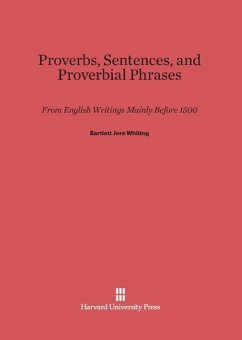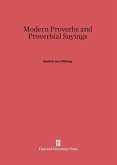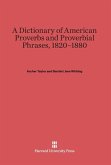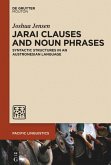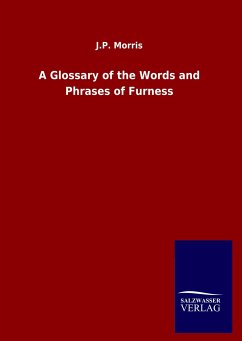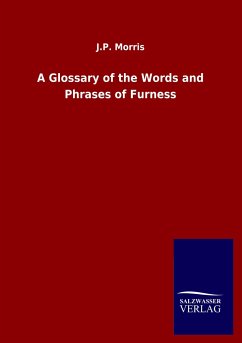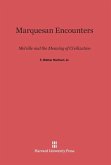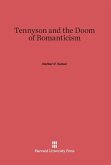This book is a collection of English proverbs, sentences, and proverbial phrases from the Middle Ages. The material is drawn from an exhaustive examination of the surviving texts, mainly printed ones but some still in manuscript. Certain books written later than 1500, usually by authors who were born twenty years or so before the turn of the century, are included, and John Heywood, the first great assembler of English proverbs, is represented by the sayings he compiled.
, "No matter how popular a saying may appear," Mr. Whiting points out in his Preface, "it comes to us at one remove or more from popular usage. The medieval proverbs which survive do so only because they were written down by educated men, none of them collectors from the field. In most cases the sayings were incorporated in literary works by authors who did not hesitate to make changes suggested by context, application, and meter. We sometimes forget that Heywood's Dialogue and Epigrams are poems, although Heywood's standards of prosody are such as to let him use proverbs without too drastic changes for rhyme and rhythm's sake. What we have in most quotations is the proverb, not as an author may have heard or read it, but in the form which suited his immediate convenience or whim."
The sayings are alphabetized by key words and the quotations are in chronological order. Cross-references link sayings of similar import, and the index is a guide to important words other than those by which the alphabetical order is established. References are given to the standard collections of English proverbs, so that the user can trace the later history of many of the sayings.
Filling a long-felt gap in the field, this work will be indispensable to students of Old and Middle English literature and of great value to everyone interested in the rich resources of proverb lore.
, "No matter how popular a saying may appear," Mr. Whiting points out in his Preface, "it comes to us at one remove or more from popular usage. The medieval proverbs which survive do so only because they were written down by educated men, none of them collectors from the field. In most cases the sayings were incorporated in literary works by authors who did not hesitate to make changes suggested by context, application, and meter. We sometimes forget that Heywood's Dialogue and Epigrams are poems, although Heywood's standards of prosody are such as to let him use proverbs without too drastic changes for rhyme and rhythm's sake. What we have in most quotations is the proverb, not as an author may have heard or read it, but in the form which suited his immediate convenience or whim."
The sayings are alphabetized by key words and the quotations are in chronological order. Cross-references link sayings of similar import, and the index is a guide to important words other than those by which the alphabetical order is established. References are given to the standard collections of English proverbs, so that the user can trace the later history of many of the sayings.
Filling a long-felt gap in the field, this work will be indispensable to students of Old and Middle English literature and of great value to everyone interested in the rich resources of proverb lore.
Though the selection is itself limited to American print between 1820 and 188o the compilers have not hesitated to add further references from many sources, not only American...This latitude greatly enhances the value and entertainment of the book. A learned preface discussing the nature of the proverb and the history of collections of proverbs is followed by a full bibliography of books drawn on and of the works of reference consulted.
[This work] goes far beyond limitations of title, and is in effect a distillation of the wit and wisdom of the American people at a most important period.
An authoritative and scholarly collection showing a wide knowledge of proverbs in other literatures.
The Dictionary's "editors are two of our foremost investigators of the proverb...They have scouted through some 200 American books of their period to give us this first dictionary of American proverbs on historical principles...[It is] an attempt to separate what is native in our culture from what is imported...Here the reader will find illuminated the relation of proverb to fable and song...The book also gives us a new view on what our ancestors were thinking and feeling a century ago...Finally, this superbly edited dictionary is, of course, a book for every student of American language and literature, its comparative references in, before, and after its period being particularly extensive and useful.
[This work] goes far beyond limitations of title, and is in effect a distillation of the wit and wisdom of the American people at a most important period.
An authoritative and scholarly collection showing a wide knowledge of proverbs in other literatures.
The Dictionary's "editors are two of our foremost investigators of the proverb...They have scouted through some 200 American books of their period to give us this first dictionary of American proverbs on historical principles...[It is] an attempt to separate what is native in our culture from what is imported...Here the reader will find illuminated the relation of proverb to fable and song...The book also gives us a new view on what our ancestors were thinking and feeling a century ago...Finally, this superbly edited dictionary is, of course, a book for every student of American language and literature, its comparative references in, before, and after its period being particularly extensive and useful.

